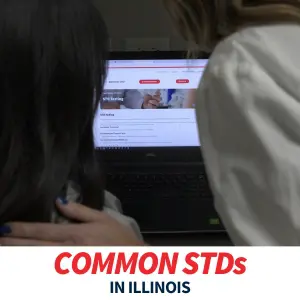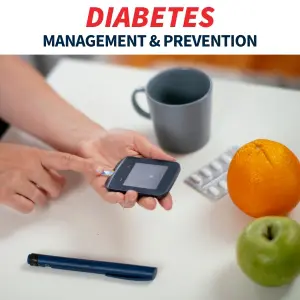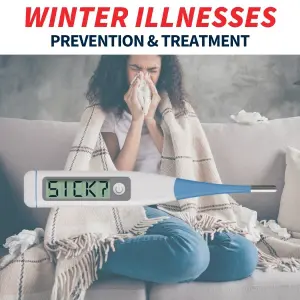Beginner’s Guide to Whooping Cough
Whooping cough, also known as pertussis, is a highly contagious respiratory illness that’s making a resurgence in the U.S. Recent preliminary data shows that more than five times as many cases of whooping cough have been reported in early November, compared to the same time in 2023. While whooping cough is often associated with infants, it is important to clarify that the illness can also infect both children and adults. Read on to learn more about what whooping cough is, how it spreads and the best ways to protect your family during the cold weather season.
What Is Whooping Cough?
Whooping cough is caused by the bacteria Bordetella pertussis, which infects the respiratory tract. Whooping cough starts off with mild symptoms akin to the common cold, but within a few weeks, it can develop into intense coughing fits. These fits can make it hard to breathe, and in more severe cases, they can cause a “whoop” sound as people struggle to catch their breath. Infants with whooping cough might not make the classic “whoop” sound, but instead may simply stop breathing for a brief period.
Whooping cough can last for weeks or even months, which is why it’s sometimes referred to as the “100-day cough.” For infants and people with weakened immune systems, it can lead to serious complications like seizures, pneumonia, or even death.
What Are the Symptoms?
Whooping cough symptoms usually develop in three stages:
- Stage 1: This initial stage can feel like nothing more than a common cold, with symptoms such as a runny nose, sneezing, low-grade fever, and mild cough. The first stage lasts for one to two weeks and is also when the disease is the most contagious.
- Stage 2: Over the next one to six weeks, people are likely to experience intense coughing fits. The coughing can be so severe that it causes vomiting, exhaustion or a red face from struggling to breathe. The second stage is when the characteristic “whoop” sound may appear, especially in children.
- Recovery Stage: In this final stage, symptoms gradually go away over several weeks. However, the cough can linger for up to several months.
Who Is Most at Risk for Complications?
While anyone can catch whooping cough, the illness can be particularly dangerous for certain individuals. Those who are most at risk of developing severe complications include:
- Infants younger than 6 months who are too young for their vaccinations or haven’t completed the full vaccination series.
- People with chronic illnesses or weakened immune systems, including older adults.
- Pregnant women and their unborn babies.
How Contagious Is Whooping Cough?
Whooping cough spreads through droplets when an infected person sneezes or coughs. Close contact with an infected person — especially in schools, households, or crowded settings — greatly increases the risk of infection. It’s highly contagious during the first stage of infection, which makes it easy for people to spread the illness without realizing it, as they may mistake their symptoms for a common cold.
Midwest Express Clinic provides same-day evaluations and treatment options for whooping cough and other contagious illnesses. With over 50 convenient locations open daily, it’s easy to get the care you need quickly to protect yourself and your loved ones.
Are There Ways to Prevent It?
Getting vaccinated is the most effective way to prevent whooping cough. The CDC recommends the following vaccinations to protect against whooping cough:
- DTaP (Diphtheria, Tetanus, and Pertussis): Given in five doses to children at 2, 4 and 6 months, with boosters administered at 15 to 18 months and 4 to 6 years.
- Tdap (Tetanus, Diphtheria, and Pertussis): This booster shot is recommended for preteens (11 to 12 years), as well as adults who accidentally missed getting their Tdap. The vaccine is especially important for pregnant women, who should get the vaccine early in the third trimester of each pregnancy. Getting a Tdap vaccine allows the mother to pass antibodies to her unborn child, providing some protection until the baby can be vaccinated.
What Are the Treatment Methods?
Treatment of whooping cough typically involves antibiotics to reduce symptoms and prevent the spread of the disease. If you or a family member develops a persistent cough, especially after exposure to someone with whooping cough, be sure to visit your nearest Midwest Express Clinic for an evaluation from a healthcare provider. Since the antibiotics used to treat whooping cough are most effective in the first stage of illness, it’s important to get diagnosed promptly to prevent complications and limit the transmission of the illness to others
In addition to antibiotics, rest, hydration and staying away from irritants like smoke can help alleviate symptoms. Until the infection has cleared, it’s important to avoid close contact with others, especially young children or those with weakened immune systems.
If you or a loved one are experiencing potential symptoms of whooping cough or have been in contact with someone who has been infected, head to Midwest Express Clinic for a comprehensive medical evaluation from one of our trusted urgent care providers. To find urgent care near you, visit midwestexpressclinic.com/locations.




